Unit 5 Feeling excited Topic 2 I’m feeling better now 课件 (共36张PPT)
文档属性
| 名称 | Unit 5 Feeling excited Topic 2 I’m feeling better now 课件 (共36张PPT) | 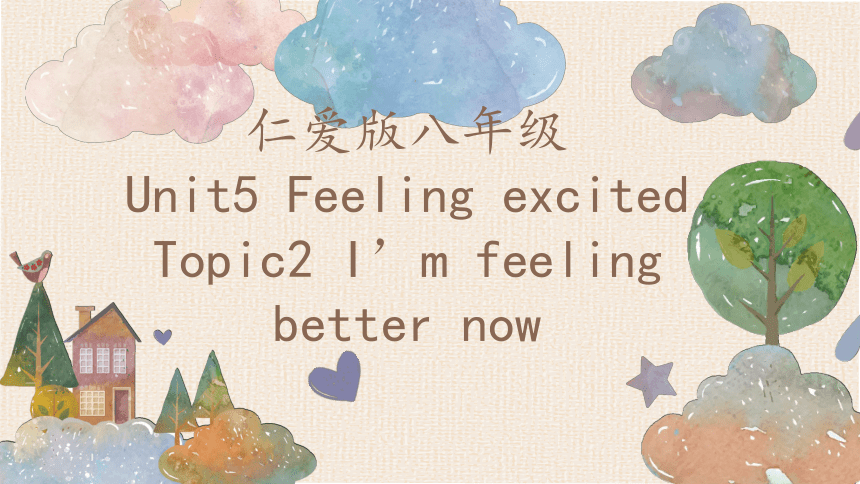 | |
| 格式 | zip | ||
| 文件大小 | 4.5MB | ||
| 资源类型 | 教案 | ||
| 版本资源 | 仁爱科普版 | ||
| 科目 | 英语 | ||
| 更新时间 | 2020-05-22 20:07:55 | ||
图片预览



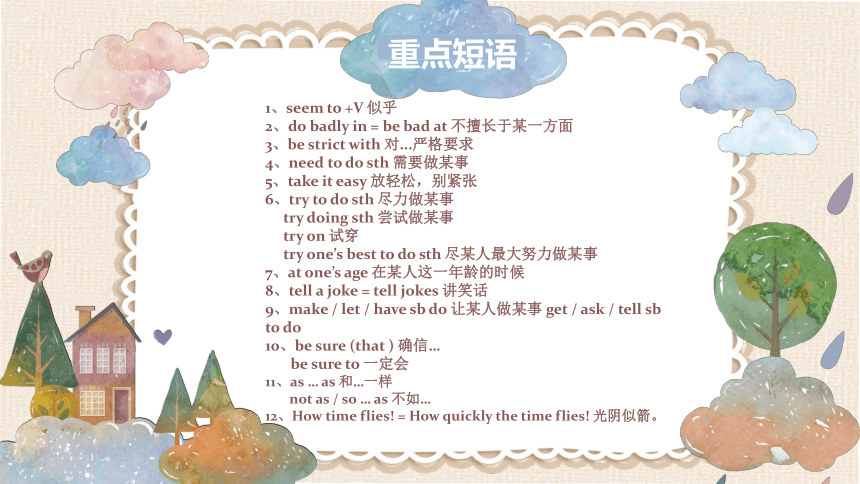
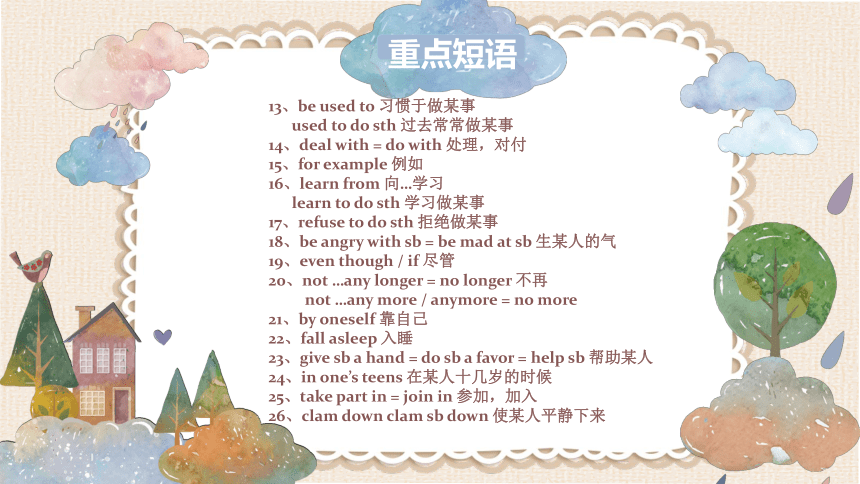
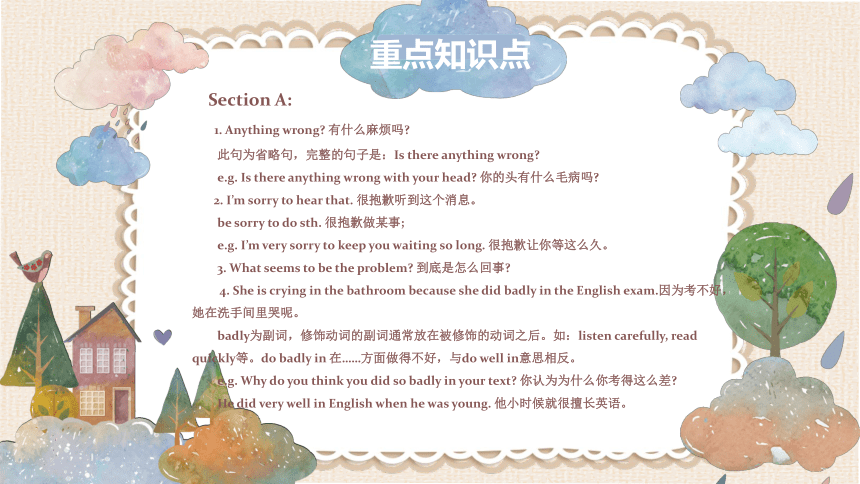
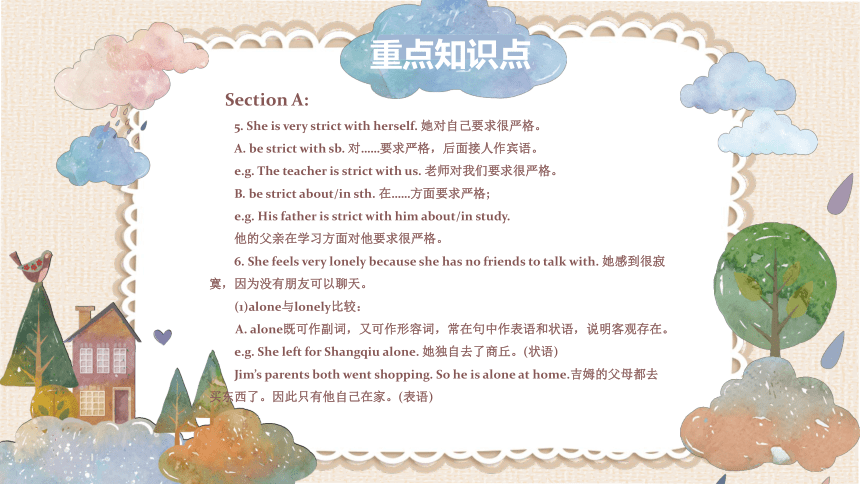
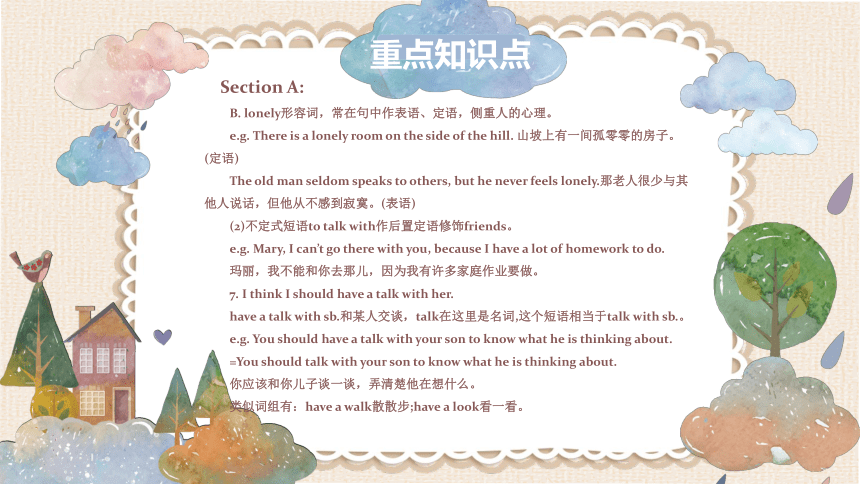
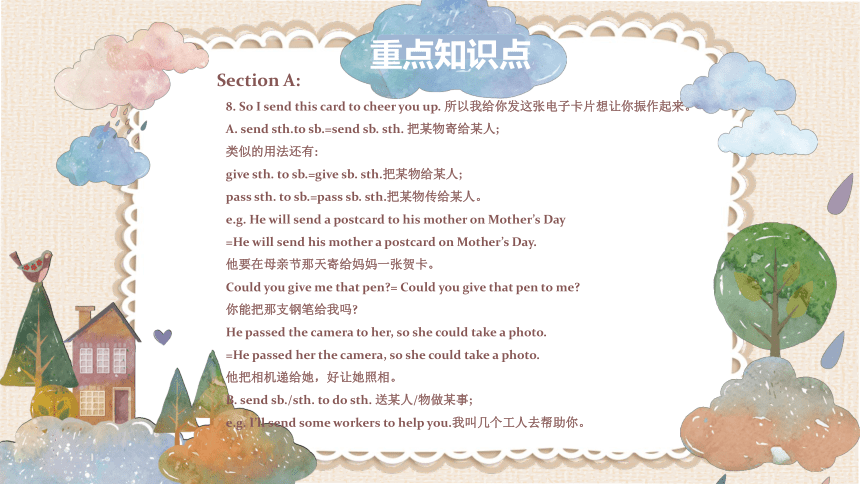
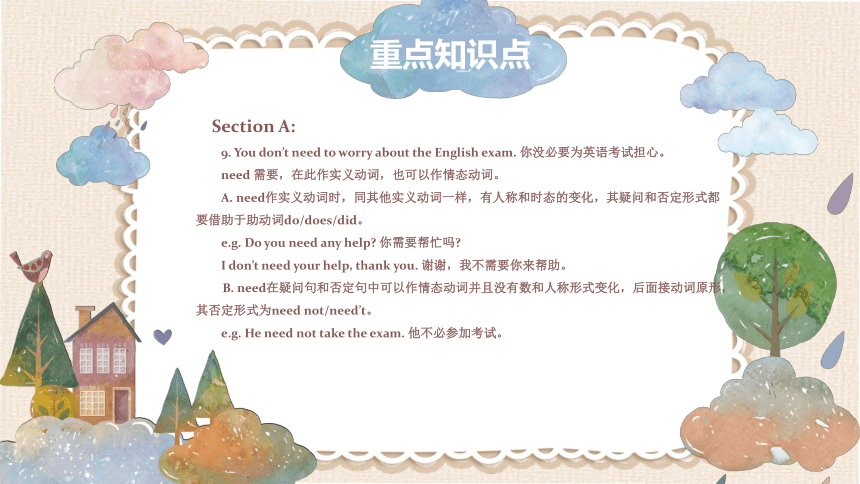
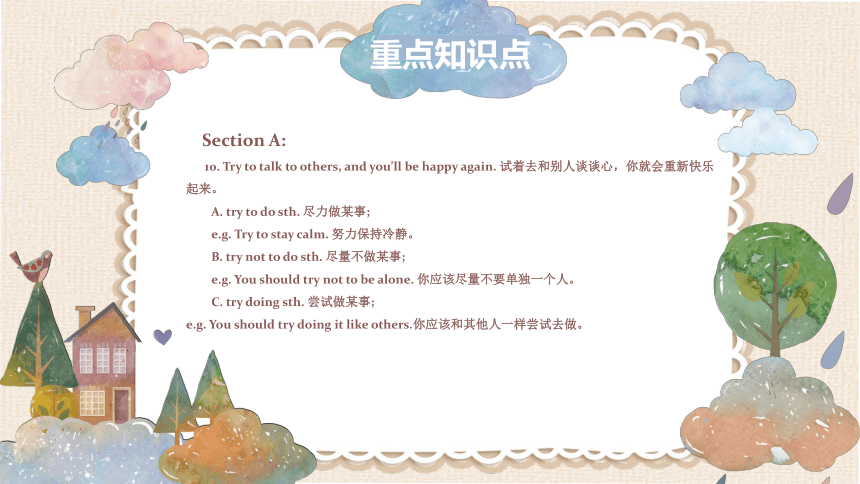
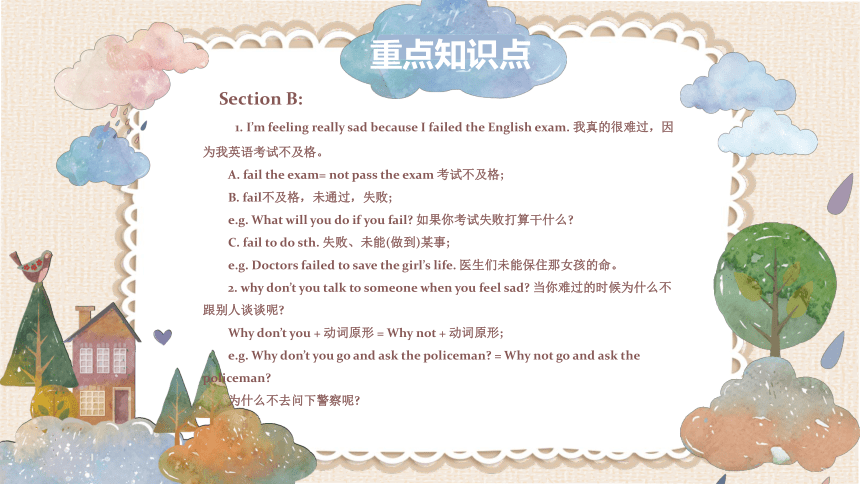
文档简介
(共36张PPT)
仁爱版八年级
Unit5 Feeling excited
Topic2 I’m feeling better now
学习目标
重点语法:原因状语从句
重点句型:形容词置于不定代词之后等
知识梳理
重点短语
重点知识点
重点语法
重点短语
1、seem to +V 似乎
2、do badly in = be bad at 不擅长于某一方面
3、be strict with 对...严格要求
4、need to do sth 需要做某事
5、take it easy 放轻松,别紧张
6、try to do sth 尽力做某事
try doing sth 尝试做某事
try on 试穿
try one’s best to do sth 尽某人最大努力做某事
7、at one’s age 在某人这一年龄的时候
8、tell a joke = tell jokes 讲笑话
9、make / let / have sb do 让某人做某事 get / ask / tell sb to do
10、be sure (that ) 确信…
be sure to 一定会
11、as … as 和…一样
not as / so … as 不如…
12、How time flies! = How quickly the time flies! 光阴似箭。
重点短语
13、be used to 习惯于做某事
used to do sth 过去常常做某事
14、deal with = do with 处理,对付
15、for example 例如
16、learn from 向…学习
learn to do sth 学习做某事
17、refuse to do sth 拒绝做某事
18、be angry with sb = be mad at sb 生某人的气
19、even though / if 尽管
20、not …any longer = no longer 不再
not …any more / anymore = no more
21、by oneself 靠自己
22、fall asleep 入睡
23、give sb a hand = do sb a favor = help sb 帮助某人
24、in one’s teens 在某人十几岁的时候
25、take part in = join in 参加,加入
26、clam down clam sb down 使某人平静下来
Section A:
1. Anything wrong? 有什么麻烦吗?
此句为省略句,完整的句子是:Is there anything wrong?
e.g. Is there anything wrong with your head? 你的头有什么毛病吗?
2. I’m sorry to hear that. 很抱歉听到这个消息。
be sorry to do sth. 很抱歉做某事;
e.g. I’m very sorry to keep you waiting so long. 很抱歉让你等这么久。
3. What seems to be the problem? 到底是怎么回事?
4. She is crying in the bathroom because she did badly in the English exam.因为考不好,她在洗手间里哭呢。
badly为副词,修饰动词的副词通常放在被修饰的动词之后。如:listen carefully, read quickly等。do badly in 在……方面做得不好,与do well in意思相反。
e.g. Why do you think you did so badly in your text? 你认为为什么你考得这么差?
He did very well in English when he was young. 他小时候就很擅长英语。
重点知识点
Section A:
5. She is very strict with herself. 她对自己要求很严格。
A. be strict with sb. 对……要求严格,后面接人作宾语。
e.g. The teacher is strict with us. 老师对我们要求很严格。
B. be strict about/in sth. 在……方面要求严格;
e.g. His father is strict with him about/in study.
他的父亲在学习方面对他要求很严格。
6. She feels very lonely because she has no friends to talk with. 她感到很寂寞,因为没有朋友可以聊天。
(1)alone与lonely比较:
A. alone既可作副词,又可作形容词,常在句中作表语和状语,说明客观存在。
e.g. She left for Shangqiu alone. 她独自去了商丘。(状语)
Jim’s parents both went shopping. So he is alone at home.吉姆的父母都去买东西了。因此只有他自己在家。(表语)
重点知识点
Section A:
B. lonely形容词,常在句中作表语、定语,侧重人的心理。
e.g. There is a lonely room on the side of the hill. 山坡上有一间孤零零的房子。(定语)
The old man seldom speaks to others, but he never feels lonely.那老人很少与其他人说话,但他从不感到寂寞。(表语)
(2)不定式短语to talk with作后置定语修饰friends。
e.g. Mary, I can’t go there with you, because I have a lot of homework to do.
玛丽,我不能和你去那儿,因为我有许多家庭作业要做。
7. I think I should have a talk with her.
have a talk with sb.和某人交谈,talk在这里是名词,这个短语相当于talk with sb.。
e.g. You should have a talk with your son to know what he is thinking about.
=You should talk with your son to know what he is thinking about.
你应该和你儿子谈一谈,弄清楚他在想什么。
类似词组有:have a walk散散步;have a look看一看。
重点知识点
Section A:
8. So I send this card to cheer you up. 所以我给你发这张电子卡片想让你振作起来。
A. send sth.to sb.=send sb. sth. 把某物寄给某人;
类似的用法还有:
give sth. to sb.=give sb. sth.把某物给某人;
pass sth. to sb.=pass sb. sth.把某物传给某人。
e.g. He will send a postcard to his mother on Mother’s Day
=He will send his mother a postcard on Mother’s Day.
他要在母亲节那天寄给妈妈一张贺卡。
Could you give me that pen?= Could you give that pen to me?
你能把那支钢笔给我吗?
He passed the camera to her, so she could take a photo.
=He passed her the camera, so she could take a photo.
他把相机递给她,好让她照相。
B. send sb./sth. to do sth. 送某人/物做某事;
e.g. I’ll send some workers to help you.我叫几个工人去帮助你。
重点知识点
Section A:
9. You don’t need to worry about the English exam. 你没必要为英语考试担心。
need 需要,在此作实义动词,也可以作情态动词。
A. need作实义动词时,同其他实义动词一样,有人称和时态的变化,其疑问和否定形式都要借助于助动词do/does/did。
e.g. Do you need any help? 你需要帮忙吗?
I don’t need your help, thank you. 谢谢,我不需要你来帮助。
B. need在疑问句和否定句中可以作情态动词并且没有数和人称形式变化,后面接动词原形,其否定形式为need not/need’t。
e.g. He need not take the exam. 他不必参加考试。
重点知识点
Section A:
10. Try to talk to others, and you’ll be happy again. 试着去和别人谈谈心,你就会重新快乐起来。
A. try to do sth. 尽力做某事;
e.g. Try to stay calm. 努力保持冷静。
B. try not to do sth. 尽量不做某事;
e.g. You should try not to be alone. 你应该尽量不要单独一个人。
C. try doing sth. 尝试做某事;
e.g. You should try doing it like others.你应该和其他人一样尝试去做。
重点知识点
Section B:
1. I’m feeling really sad because I failed the English exam. 我真的很难过,因为我英语考试不及格。
A. fail the exam= not pass the exam 考试不及格;
B. fail不及格,未通过,失败;
e.g. What will you do if you fail? 如果你考试失败打算干什么?
C. fail to do sth. 失败、未能(做到)某事;
e.g. Doctors failed to save the girl’s life. 医生们未能保住那女孩的命。
2. why don’t you talk to someone when you feel sad? 当你难过的时候为什么不跟别人谈谈呢?
Why don’t you + 动词原形 = Why not + 动词原形;
e.g. Why don’t you go and ask the policeman? = Why not go and ask the policeman?
为什么不去问下警察呢?
重点知识点
Section B:
3. Everyone get these feelings at your age. 每个人在你这个年龄都会有这些感受。
(1)everyone与every one的区别:
everyone意为“每人”,“人人”,只指人,不指物,后面不能跟of短语;every one意为“每个”,通常用来指物,后面可以跟of短语。
e.g. Is everyone here today? 今天大家都到了吗?
His books are wonderful. I have read every one of them.他的书很精彩,每一本我都读了。 书很精彩,每一本我都读了。
(2)A. at one’s age 在某人的年龄时;
e.g. Your father began to work at your age. 你父亲在你这个年龄就开始工作了。
B. at the age of... 在……岁时;可以和when互换;
e.g. At the age of seven, he could swim. = When he was seven, he could swim.
在7岁时,他就会游泳。
重点知识点
Section B:
4. She always tells me jokes and makes me laugh. 她总是给我讲笑话让我笑。
(1)tell jokes 讲笑话;
(2)make sb. do sth. 意为“让某人做某事”;
laugh是宾语me的补足语。make后面的宾语补足语可以是不带to的不定式、名词、形容词、副词等。
e.g. We made him monitor. 我们选他当班长。
Illness always makes us sad, worried and frightened. 疾病总让我们难过、焦虑和恐惧。
Mr. White made us in. 怀特先生让我们进去了。
P.S. have和let与make一样,后面可以跟上不带to的不定式作宾语补足语,其结构为:make/have/ let sb. do sth.
e.g. The landlord made him work day and night in the old days.在旧社会,地主让他没日没夜地工作。
I’ll have someone clean out your room.我会叫人把你的房间打扫干净。
The policeman let him wait outside.警察让他在外面等。
重点知识点
Section B:
5. I’m sure she would like to be your friend. 我相信她愿意成为你的好朋友。
(1) I’m sure... 我相信……;sure为形容词,意为“确信的, 有把握的”。
A. be sure + that从句;
e.g. I’m sure (that) he is right. 我确信他是对的。
B. be sure of +名词,意为“对……有把握”;
e.g. You are sure of a welcome at my house. 无论你什么时候到我家来都会受到欢迎。
C. be sure to do sth. 一定会做……;
e.g. You are sure to win the game. 你们一定会赢得这场比赛。
(2)would like to do sth. 想要做某事; would like sth. 想要某物;
e.g. I would like to go to Beijing. 我想去北京。
I would like a toy. 我想要一个玩具。
6. There, there! It’ll be OK. 好啦,好啦!一切都会好起来的。
There, there! 好啦,好啦!there在这里是语气词,表示安慰别人。
重点知识点
Section B:
7. Would you like to become my friend, Helen?你想成为我的朋友吗?
(1) Would like ......? 意为“你愿意……吗?”,后接名词或to do sth.; 表示向对方提出有礼貌的请求、邀请、希望或询问等。同义句:Do you want .......?
肯定回答多用:Yes, I’d like/love to. / Certainly. / Yes, thank you.
否定回答:No, thank you. / I’d like to , but.....
类似句型:Would you mind ...? ……你介意吗?后接doing sth.。
e.g. —Would you like to go shopping with us? 你愿意和我们一块儿去购物吗?
—I’d like to. 我很乐意。
Would you mind using your book for a while?借你的书用一会儿,你介意吗?
(2) become one’s friend 成为某人的朋友;
重点知识点
Section B:
8. If you have any problems with your studies, just let me know. 如果你学习有什么问题,告诉我。
let sb. do sth.意为“让某人做某事”。类似的使役动词还有make, have等,后面接不带to的不定式,形容词、介词短语等作宾语补足语。
e.g. My mother lets me drink milk every day. 妈妈让我每天喝牛奶。
Have him do it. 让他去做。
9. I find it difficult to learn English well. 我发现学好英语好难。
find/feel/think +it+adj.+to do sth. 此句结构为:动词+宾语+宾语补足语,当不定式作find,feel,think等动词的宾语时,必须用it作形式宾语,相当于其后所接的宾语从句。
e.g. We find it useful to watch English movies. = We find that it is useful to watch English movies.
我们发现看英语电影很有用。
I think it necessary to exercise every day. 我认为每天有必要做锻炼。
重点知识点
Section B:
10. Don’t worry. I’ll help you with it. 别担心,我来帮你。
help sb. with sth. 意为“在……方面帮助某人”;
e.g. Could you help me with my English? 你能帮我学英语吗?
11. You’re so kind to me. 你对我太好了。
A. be kind to sb. 对某人好;
e.g. Miss wang is kind to every student. 王老师对每个学生都很好。
B. be kind of sb. 某人很好;
e.g. It is very kind of you to help me with my English. 你帮助我学习英语,你真好。
重点知识点
Section C:
1. How time flies! 是How quickly time flies!的简略形式。时间过得真快!(时光飞逝!)
2. What’s more, I couldn’t sleep as well as usual. 而且我不能像平常一样睡好觉。
(1)What’s more 此外,而且,是插入语,是一种独立成分,可置于分句或句子之首、之尾或之中。
e.g. What’s more, he is only a nine- year-old boy. 此外,他只是一个九岁大的男孩。
(2)A. as/so.......as..... 与……一样;
e.g. She is as tall as her mother. 她和她妈妈一样高。
B. not as/so ... as ... 不如……,和……不一样……。注意:not as/so ... as ... 中间用形容词或副词的原级。
e.g. Li Ting isn’t as/so tall as Hu Ming.李婷没有胡明高。
(3)as usual 像平常一样,用作状语。
e.g. That day, he got up early as usual, but he missed his bus. 那天,他起得像往常一样早,可是他却未赶上公交车。
3. I was not used to anything here. 我不习惯这里的一切。
A. be/get used to sth. 习惯,适应;
e.g. He can’t get used to the weather here.他不习惯这儿的天气。
B. get/be used to doing sth.习惯于做……;
e.g. I am used to getting up early. 我习惯于早起。
C. used to do sth.过去常常做某事(现在不做了);
e.g. I used to watch TV after supper. 以前晚饭后我常看电视。
D. be used to do sth. 被用来做某事;
e.g. Wood is used to make paper. 树木被用来造纸。
重点知识点
Section C:
4. With the help of my teachers and classmates, I’m getting used to the life here. 在老师和同学们的帮助下,我习惯了这里的生活。
With the help of....... 在某人的帮助下;
e.g. With the help of Jack, my spoken English is better now. 在杰克的帮助下,我的口语好多了。
5. I’m not afraid to talk with others now. My classmates all accept me. 现在我不害怕和其他人讲话了。同学们也都接纳了我。
(1)A. be afraid to do sth. 不敢做某事,可与be afraid of doing sth. 转换。
e.g. The little boy is afraid to touch the fire again.
=The little boy is afraid of touching the fire again.
那男孩再也不敢碰火了。
B. be afraid of (doing) sth. 害怕(做)某事(物);
e.g. The girl is afraid of dogs. 这个女孩怕狗。
I’m afraid of going out alone at night. 晚上我不敢独自外出。
(2)talk with others 和其他人讲话;
重点知识点
(3)accept 收到,接受,同义词还有receive。 receive表示客观上收到别人给予的东西,不含收件人是否愿意接受;而accept 则强调主观上愿意接受。
e.g. Our teacher always receives many cards on Teachers’ Day.
我们的老师在教师节总会收到许多卡片。
He asked her to marry him and she accepted. 他向她求婚,她接受了。
6. Please give my best wishes to your parents. 请代我向你父母问好。
give one’s best wishes to sb. 代某人向某人问好;
e.g. Please give my best wishes to Miss Wang. 请代我向王老师问好。
Section D:
1.If you don’t know how to deal with these problems, you may learn something from Jeff. 如果你不知道怎么解决这些问题,你可以从杰夫那里学到一些方法。
(1)deal with 处理,解决,对付,后接名词。同义短语:do with处置,处理(可换用);
e.g. Who will help you to deal with the problem?谁愿帮你解决这个问题呢?
What did you do with the old books? = how did you deal with the old book?
你怎么处理那些旧书?
(2)learn from..... 向…学习,从…获得[吸取];
e.g. I wish that people actually learn from their mistakes.
重点知识点
原因状语从句
1. 定义:在句中用来说明主句原因的句子叫原因状语从句。
2. 常用引导词: because (因为), as (由于), since (既然), now (that) (既然)
3. 时态:原因状语从句一般都是根据实际情况选用适当的时态。通常是主过从过,主现从现
4.because, since和as的区别:
(1) because引导的原因状语从句一般放于主句的后面,because从句位于句首时要用逗号分开,放在句末时,可不用逗号分开。because表示直接原因, 语气最强, 最适合回答why引导的疑问句。because of 也表示原因,但它后面不接从句, 只能接名词, 代词或动名词。注意:because 和so 不可同时出现在一个句子里。
I do it because I like it. = I like it so I do it.因为我喜欢它,所以我做。
He can’t go to school because of his illness.因为他生病了,所以没去学校。
重点语法
原因状语从句
(2) since引导的原因状语从句一般放于主句之前表示已知的、 显然的理由(通常被翻译成“既然”= now that ), 较为正式, 语气比because弱。
Since you are free today, you had better help me with my math. 既然你今天有空,你最好帮下我的数学。
Now (that) you are grown up, you should not rely on your parents.既然你长大了,你就不能依赖你的父母。
(3) as 引导原因状语从句时表示附带说明的“双方已知的原因”,含有对比说明的意味, 语气比since弱, 较为正式, 位置较为灵活(常放于主句之前)。
As it is raining, you’d better take a taxi.因为下雨,你最好搭辆的士。
(4) for引导的是并列句表示原因但并不说明主句行为发生的直接原因, 只提供一些辅助性的补充说明, for引导的并列句只能放于主句之后并且必须用逗号将其与主句隔开。
He could not have seen me, for I was not there.因为我没在那里,所以他没看见我。
重点语法
Section A:
一、根据首字母或汉语提示完成单词或短语,使句意完整。
1. My parents are quite _____ (严格的)?with me in my study.
2. —Tom, what are you doing?
—I’m preparing for tomorrow’s English e_____.
3. Mr. Liu is a lonely man, so he has few friends to _____ _____ (交谈).
4. The girl is too _____ (害羞的)to speak in class.
5. Michael _____ (跌倒) from the bike and hurt himself yesterday.
二、按要求完成下列句子。每空一词。
1. Jim was late for school?because he got up late. (就画线部分提问)
______ ______ Jim late for school?
2. Li Hong did badly in the English exam. (改为否定句)
Li Hong ______ ______ badly in the English exam.
3. Helen is worried about Li Hong. (同义句转换)
Helen ______ ______ Li Hong.
4. Li Hong is not happy. (同义句转换)
Li Hong is ______.
5. Han Mei feels lonely in the school. (改为一般疑问句)
______ Han Mei ______ lonely in the school?
随堂练习
Section A:
一、根据首字母或汉语提示完成单词或短语,使句意完整。
1. My parents are quite _____ (严格的)?with me in my study.
2. —Tom, what are you doing?
—I’m preparing for tomorrow’s English e_____.
3. Mr. Liu is a lonely man, so he has few friends to _____ _____ (交谈).
4. The girl is too _____ (害羞的)to speak in class.
5. Michael _____ (跌倒) from the bike and hurt himself yesterday.
二、按要求完成下列句子。每空一词。
1. Jim was late for school?because he got up late. (就画线部分提问)
______ ______ Jim late for school?
2. Li Hong did badly in the English exam. (改为否定句)
Li Hong ______ ______ badly in the English exam.
3. Helen is worried about Li Hong. (同义句转换)
Helen ______ ______ Li Hong.
4. Li Hong is not happy. (同义句转换)
Li Hong is ______.
5. Han Mei feels lonely in the school. (改为一般疑问句)
______ Han Mei ______ lonely in the school?
答案:strict; exam; talk with; shy; fell
Why was; didn’t do; worries about; unhappy; Does feel
随堂练习
Section B:
一、根据句意,用适当的介词填空。
1. Liu Qian is my favorite. I often talk ______ my friends ______ his magic performs.
2. —Michael, did you meet your Chinese friend Shangxia ______ the age of twelve?
—Yes. ______ the way, he is a Japanese, not a Chinese.
3. Susan is ______ Guangdong. She isn’t used ______ the food here.
4. —Jim, let me help you ______ your Chinese.
—Oh, it’s very nice ______ you. Thank you.
5. Jane is so sad because she failed ______ the maths exam again.
随堂练习
Section B:
一、根据句意,用适当的介词填空。
1. Liu Qian is my favorite. I often talk ______ my friends ______ his magic performs.
2. —Michael, did you meet your Chinese friend Shangxia ______ the age of twelve?
—Yes. ______ the way, he is a Japanese, not a Chinese.
3. Susan is ______ Guangdong. She isn’t used ______ the food here.
4. —Jim, let me help you ______ your Chinese.
—Oh, it’s very nice ______ you. Thank you.
5. Jane is so sad because she failed ______ the maths exam again.
答案:with about; at by; in to; with of; in
随堂练习
Section B:
二、根据汉语意思及括号中的英文提示词翻译句子。
1.?我想和凯特交朋友。(make friends with)
________________________________________________________
2.?在这样的年纪就能帮助别人,你很了不起。(at one’s age)
________________________________________________________
3.?考试前你应该好好休息。(have a good rest)
________________________________________________________
4.?在生活中我们应当懂得如何终止不愉快的心情。(how to)
________________________________________________________
5.?王叔叔喜欢讲笑话让我们笑。(tell jokes)
________________________________________________________
随堂练习
Section B:
二、根据汉语意思及括号中的英文提示词翻译句子。
1.?我想和凯特交朋友。(make friends with)
________________________________________________________
2.?在这样的年纪就能帮助别人,你很了不起。(at one’s age)
________________________________________________________
3.?考试前你应该好好休息。(have a good rest)
________________________________________________________
4.?在生活中我们应当懂得如何终止不愉快的心情。(how to)
________________________________________________________
5.?王叔叔喜欢讲笑话让我们笑。(tell jokes)
________________________________________________________
答案:1. I want to make friends with Kate.
2. You are great to help others at your age.
3. You must have a good rest before the exam.
4. In life we should know how to stop the unhappy mood.
5. Mr. Wang likes telling jokes to make us laugh.
随堂练习
Section C:
一、根据首字母提示完成单词,使句意完整。
1. —How did Lisa come to work today?
——She came by subway as u______.
2. Young people are lively and active. They can a______ new ideas very quickly.
3. —Excuse me, could you tell me where the bookshop is?
—Sorry, I don’t know, e______.
4. Tonny is a very 1______ boy. All the teachers like him.
5. An English-Chinese dictionary is a h______ book for us to learn English.
二、根据句意及汉语提示完成句子。每空一词。
1. ______ ______ ______ (时光飞逝)! I stay in Beijing for over half a month.
2. Miss Wang speaks English ______ ______ ______ (与……一样好)him.
3. ______ ______ ______ (在那时候)she didn’t get to sleep, either.
4. He came back home late. ______ ______ (并且), he lost his bike.
5. The teacher ______ ______ (友好)to all the students.
随堂练习
Section C:
一、根据首字母提示完成单词,使句意完整。
1. —How did Lisa come to work today?
——She came by subway as u______.
2. Young people are lively and active. They can a______ new ideas very quickly.
3. —Excuse me, could you tell me where the bookshop is?
—Sorry, I don’t know, e______.
4. Tonny is a very 1______ boy. All the teachers like him.
5. An English-Chinese dictionary is a h______ book for us to learn English.
二、根据句意及汉语提示完成句子。每空一词。
1. ______ ______ ______ (时光飞逝)! I stay in Beijing for over half a month.
2. Miss Wang speaks English ______ ______ ______ (与……一样好)him.
3. ______ ______ ______ (在那时候)she didn’t get to sleep, either.
4. He came back home late. ______ ______ (并且), he lost his bike.
5. The teacher ______ ______ (友好)to all the students.
答案:usual; accept; either; lovely; helpful;
How time flies; as well as; At that time; What’s more; is friendly
随堂练习
Section D:
一、单项选择。
1. —Kate, did your mother buy the story-books for you?
—No, she ____ to pay for it. She didn’t want me to spend too much time on them.
A. had ? ? ? ? ? ? ? ? ? ? ? B. refused?????????????????
C. asked ?????????????????? D. got
2. —Do you have any sisters?
—Yes, I have an ____ sister. I am 3 years younger than her.
A. old ? ? ? ? ? ? ? ? ? ? ? ?B. older ???????????????????
C. oldest ?????????????????? D. elder
3. There is not enough time, Jim. Don’t say anything ____ to me.
A. useless ? ? ? ? ? ? ? ? ? B. useful????????????????????
C. usefully ??????????????? D. used
4. The farmers kept on working in the fields, ____ it was raining heavily.
A. even though ? ? ? ? ?B. because?????????????????
C. instead ????????? ?????? D. what’s more
5. I wasn’t able to find the key to the door. I didn’t know how ____ it.
A. to work with ? ? ? ? B. to deal with??????????
C. to look for ?????????? D. to open
随堂练习
Section D:
一、单项选择。
1. —Kate, did your mother buy the story-books for you?
—No, she ____ to pay for it. She didn’t want me to spend too much time on them.
A. had ? ? ? ? ? ? ? ? ? ? ? B. refused?????????????????
C. asked ?????????????????? D. got
2. —Do you have any sisters?
—Yes, I have an ____ sister. I am 3 years younger than her.
A. old ? ? ? ? ? ? ? ? ? ? ? ?B. older ???????????????????
C. oldest ?????????????????? D. elder
3. There is not enough time, Jim. Don’t say anything ____ to me.
A. useless ? ? ? ? ? ? ? ? ? B. useful????????????????????
C. usefully ??????????????? D. used
4. The farmers kept on working in the fields, ____ it was raining heavily.
A. even though ? ? ? ? ?B. because?????????????????
C. instead ????????? ?????? D. what’s more
5. I wasn’t able to find the key to the door. I didn’t know how ____ it.
A. to work with ? ? ? ? B. to deal with??????????
C. to look for ?????????? D. to open
答案:B; D; A; A; B
随堂练习
Section D:
二、按要求改写句子,每空一词。
1. I am sure she will be your friend. (改为否定句)
I ______ ______ sure she will be your friend.
2. She didn’t go to the park?because she was ill. (对画线部分提问)
______ ______ she go to the park?
3. It seems that our team will win the game. (改为同义句)
Our team ______ ______ win the game.
4. Kangkang wants to become a friend of Michael. (改为同义句)
Kangkang wants to ______ ______ ______ Michael.
5.?她对自己要求非常严格。(完成译句)
She is very ______ ______ herself.
随堂练习
Section D:
二、按要求改写句子,每空一词。
1. I am sure she will be your friend. (改为否定句)
I ______ ______ sure she will be your friend.
2. She didn’t go to the park?because she was ill. (对画线部分提问)
______ ______ she go to the park?
3. It seems that our team will win the game. (改为同义句)
Our team ______ ______ win the game.
4. Kangkang wants to become a friend of Michael. (改为同义句)
Kangkang wants to ______ ______ ______ Michael.
5.?她对自己要求非常严格。(完成译句)
She is very ______ ______ herself.
答案:am not; Why didn’t; seems to; make friends with; strict with
随堂练习
谢谢观看!
仁爱版八年级
Unit5 Feeling excited
Topic2 I’m feeling better now
学习目标
重点语法:原因状语从句
重点句型:形容词置于不定代词之后等
知识梳理
重点短语
重点知识点
重点语法
重点短语
1、seem to +V 似乎
2、do badly in = be bad at 不擅长于某一方面
3、be strict with 对...严格要求
4、need to do sth 需要做某事
5、take it easy 放轻松,别紧张
6、try to do sth 尽力做某事
try doing sth 尝试做某事
try on 试穿
try one’s best to do sth 尽某人最大努力做某事
7、at one’s age 在某人这一年龄的时候
8、tell a joke = tell jokes 讲笑话
9、make / let / have sb do 让某人做某事 get / ask / tell sb to do
10、be sure (that ) 确信…
be sure to 一定会
11、as … as 和…一样
not as / so … as 不如…
12、How time flies! = How quickly the time flies! 光阴似箭。
重点短语
13、be used to 习惯于做某事
used to do sth 过去常常做某事
14、deal with = do with 处理,对付
15、for example 例如
16、learn from 向…学习
learn to do sth 学习做某事
17、refuse to do sth 拒绝做某事
18、be angry with sb = be mad at sb 生某人的气
19、even though / if 尽管
20、not …any longer = no longer 不再
not …any more / anymore = no more
21、by oneself 靠自己
22、fall asleep 入睡
23、give sb a hand = do sb a favor = help sb 帮助某人
24、in one’s teens 在某人十几岁的时候
25、take part in = join in 参加,加入
26、clam down clam sb down 使某人平静下来
Section A:
1. Anything wrong? 有什么麻烦吗?
此句为省略句,完整的句子是:Is there anything wrong?
e.g. Is there anything wrong with your head? 你的头有什么毛病吗?
2. I’m sorry to hear that. 很抱歉听到这个消息。
be sorry to do sth. 很抱歉做某事;
e.g. I’m very sorry to keep you waiting so long. 很抱歉让你等这么久。
3. What seems to be the problem? 到底是怎么回事?
4. She is crying in the bathroom because she did badly in the English exam.因为考不好,她在洗手间里哭呢。
badly为副词,修饰动词的副词通常放在被修饰的动词之后。如:listen carefully, read quickly等。do badly in 在……方面做得不好,与do well in意思相反。
e.g. Why do you think you did so badly in your text? 你认为为什么你考得这么差?
He did very well in English when he was young. 他小时候就很擅长英语。
重点知识点
Section A:
5. She is very strict with herself. 她对自己要求很严格。
A. be strict with sb. 对……要求严格,后面接人作宾语。
e.g. The teacher is strict with us. 老师对我们要求很严格。
B. be strict about/in sth. 在……方面要求严格;
e.g. His father is strict with him about/in study.
他的父亲在学习方面对他要求很严格。
6. She feels very lonely because she has no friends to talk with. 她感到很寂寞,因为没有朋友可以聊天。
(1)alone与lonely比较:
A. alone既可作副词,又可作形容词,常在句中作表语和状语,说明客观存在。
e.g. She left for Shangqiu alone. 她独自去了商丘。(状语)
Jim’s parents both went shopping. So he is alone at home.吉姆的父母都去买东西了。因此只有他自己在家。(表语)
重点知识点
Section A:
B. lonely形容词,常在句中作表语、定语,侧重人的心理。
e.g. There is a lonely room on the side of the hill. 山坡上有一间孤零零的房子。(定语)
The old man seldom speaks to others, but he never feels lonely.那老人很少与其他人说话,但他从不感到寂寞。(表语)
(2)不定式短语to talk with作后置定语修饰friends。
e.g. Mary, I can’t go there with you, because I have a lot of homework to do.
玛丽,我不能和你去那儿,因为我有许多家庭作业要做。
7. I think I should have a talk with her.
have a talk with sb.和某人交谈,talk在这里是名词,这个短语相当于talk with sb.。
e.g. You should have a talk with your son to know what he is thinking about.
=You should talk with your son to know what he is thinking about.
你应该和你儿子谈一谈,弄清楚他在想什么。
类似词组有:have a walk散散步;have a look看一看。
重点知识点
Section A:
8. So I send this card to cheer you up. 所以我给你发这张电子卡片想让你振作起来。
A. send sth.to sb.=send sb. sth. 把某物寄给某人;
类似的用法还有:
give sth. to sb.=give sb. sth.把某物给某人;
pass sth. to sb.=pass sb. sth.把某物传给某人。
e.g. He will send a postcard to his mother on Mother’s Day
=He will send his mother a postcard on Mother’s Day.
他要在母亲节那天寄给妈妈一张贺卡。
Could you give me that pen?= Could you give that pen to me?
你能把那支钢笔给我吗?
He passed the camera to her, so she could take a photo.
=He passed her the camera, so she could take a photo.
他把相机递给她,好让她照相。
B. send sb./sth. to do sth. 送某人/物做某事;
e.g. I’ll send some workers to help you.我叫几个工人去帮助你。
重点知识点
Section A:
9. You don’t need to worry about the English exam. 你没必要为英语考试担心。
need 需要,在此作实义动词,也可以作情态动词。
A. need作实义动词时,同其他实义动词一样,有人称和时态的变化,其疑问和否定形式都要借助于助动词do/does/did。
e.g. Do you need any help? 你需要帮忙吗?
I don’t need your help, thank you. 谢谢,我不需要你来帮助。
B. need在疑问句和否定句中可以作情态动词并且没有数和人称形式变化,后面接动词原形,其否定形式为need not/need’t。
e.g. He need not take the exam. 他不必参加考试。
重点知识点
Section A:
10. Try to talk to others, and you’ll be happy again. 试着去和别人谈谈心,你就会重新快乐起来。
A. try to do sth. 尽力做某事;
e.g. Try to stay calm. 努力保持冷静。
B. try not to do sth. 尽量不做某事;
e.g. You should try not to be alone. 你应该尽量不要单独一个人。
C. try doing sth. 尝试做某事;
e.g. You should try doing it like others.你应该和其他人一样尝试去做。
重点知识点
Section B:
1. I’m feeling really sad because I failed the English exam. 我真的很难过,因为我英语考试不及格。
A. fail the exam= not pass the exam 考试不及格;
B. fail不及格,未通过,失败;
e.g. What will you do if you fail? 如果你考试失败打算干什么?
C. fail to do sth. 失败、未能(做到)某事;
e.g. Doctors failed to save the girl’s life. 医生们未能保住那女孩的命。
2. why don’t you talk to someone when you feel sad? 当你难过的时候为什么不跟别人谈谈呢?
Why don’t you + 动词原形 = Why not + 动词原形;
e.g. Why don’t you go and ask the policeman? = Why not go and ask the policeman?
为什么不去问下警察呢?
重点知识点
Section B:
3. Everyone get these feelings at your age. 每个人在你这个年龄都会有这些感受。
(1)everyone与every one的区别:
everyone意为“每人”,“人人”,只指人,不指物,后面不能跟of短语;every one意为“每个”,通常用来指物,后面可以跟of短语。
e.g. Is everyone here today? 今天大家都到了吗?
His books are wonderful. I have read every one of them.他的书很精彩,每一本我都读了。 书很精彩,每一本我都读了。
(2)A. at one’s age 在某人的年龄时;
e.g. Your father began to work at your age. 你父亲在你这个年龄就开始工作了。
B. at the age of... 在……岁时;可以和when互换;
e.g. At the age of seven, he could swim. = When he was seven, he could swim.
在7岁时,他就会游泳。
重点知识点
Section B:
4. She always tells me jokes and makes me laugh. 她总是给我讲笑话让我笑。
(1)tell jokes 讲笑话;
(2)make sb. do sth. 意为“让某人做某事”;
laugh是宾语me的补足语。make后面的宾语补足语可以是不带to的不定式、名词、形容词、副词等。
e.g. We made him monitor. 我们选他当班长。
Illness always makes us sad, worried and frightened. 疾病总让我们难过、焦虑和恐惧。
Mr. White made us in. 怀特先生让我们进去了。
P.S. have和let与make一样,后面可以跟上不带to的不定式作宾语补足语,其结构为:make/have/ let sb. do sth.
e.g. The landlord made him work day and night in the old days.在旧社会,地主让他没日没夜地工作。
I’ll have someone clean out your room.我会叫人把你的房间打扫干净。
The policeman let him wait outside.警察让他在外面等。
重点知识点
Section B:
5. I’m sure she would like to be your friend. 我相信她愿意成为你的好朋友。
(1) I’m sure... 我相信……;sure为形容词,意为“确信的, 有把握的”。
A. be sure + that从句;
e.g. I’m sure (that) he is right. 我确信他是对的。
B. be sure of +名词,意为“对……有把握”;
e.g. You are sure of a welcome at my house. 无论你什么时候到我家来都会受到欢迎。
C. be sure to do sth. 一定会做……;
e.g. You are sure to win the game. 你们一定会赢得这场比赛。
(2)would like to do sth. 想要做某事; would like sth. 想要某物;
e.g. I would like to go to Beijing. 我想去北京。
I would like a toy. 我想要一个玩具。
6. There, there! It’ll be OK. 好啦,好啦!一切都会好起来的。
There, there! 好啦,好啦!there在这里是语气词,表示安慰别人。
重点知识点
Section B:
7. Would you like to become my friend, Helen?你想成为我的朋友吗?
(1) Would like ......? 意为“你愿意……吗?”,后接名词或to do sth.; 表示向对方提出有礼貌的请求、邀请、希望或询问等。同义句:Do you want .......?
肯定回答多用:Yes, I’d like/love to. / Certainly. / Yes, thank you.
否定回答:No, thank you. / I’d like to , but.....
类似句型:Would you mind ...? ……你介意吗?后接doing sth.。
e.g. —Would you like to go shopping with us? 你愿意和我们一块儿去购物吗?
—I’d like to. 我很乐意。
Would you mind using your book for a while?借你的书用一会儿,你介意吗?
(2) become one’s friend 成为某人的朋友;
重点知识点
Section B:
8. If you have any problems with your studies, just let me know. 如果你学习有什么问题,告诉我。
let sb. do sth.意为“让某人做某事”。类似的使役动词还有make, have等,后面接不带to的不定式,形容词、介词短语等作宾语补足语。
e.g. My mother lets me drink milk every day. 妈妈让我每天喝牛奶。
Have him do it. 让他去做。
9. I find it difficult to learn English well. 我发现学好英语好难。
find/feel/think +it+adj.+to do sth. 此句结构为:动词+宾语+宾语补足语,当不定式作find,feel,think等动词的宾语时,必须用it作形式宾语,相当于其后所接的宾语从句。
e.g. We find it useful to watch English movies. = We find that it is useful to watch English movies.
我们发现看英语电影很有用。
I think it necessary to exercise every day. 我认为每天有必要做锻炼。
重点知识点
Section B:
10. Don’t worry. I’ll help you with it. 别担心,我来帮你。
help sb. with sth. 意为“在……方面帮助某人”;
e.g. Could you help me with my English? 你能帮我学英语吗?
11. You’re so kind to me. 你对我太好了。
A. be kind to sb. 对某人好;
e.g. Miss wang is kind to every student. 王老师对每个学生都很好。
B. be kind of sb. 某人很好;
e.g. It is very kind of you to help me with my English. 你帮助我学习英语,你真好。
重点知识点
Section C:
1. How time flies! 是How quickly time flies!的简略形式。时间过得真快!(时光飞逝!)
2. What’s more, I couldn’t sleep as well as usual. 而且我不能像平常一样睡好觉。
(1)What’s more 此外,而且,是插入语,是一种独立成分,可置于分句或句子之首、之尾或之中。
e.g. What’s more, he is only a nine- year-old boy. 此外,他只是一个九岁大的男孩。
(2)A. as/so.......as..... 与……一样;
e.g. She is as tall as her mother. 她和她妈妈一样高。
B. not as/so ... as ... 不如……,和……不一样……。注意:not as/so ... as ... 中间用形容词或副词的原级。
e.g. Li Ting isn’t as/so tall as Hu Ming.李婷没有胡明高。
(3)as usual 像平常一样,用作状语。
e.g. That day, he got up early as usual, but he missed his bus. 那天,他起得像往常一样早,可是他却未赶上公交车。
3. I was not used to anything here. 我不习惯这里的一切。
A. be/get used to sth. 习惯,适应;
e.g. He can’t get used to the weather here.他不习惯这儿的天气。
B. get/be used to doing sth.习惯于做……;
e.g. I am used to getting up early. 我习惯于早起。
C. used to do sth.过去常常做某事(现在不做了);
e.g. I used to watch TV after supper. 以前晚饭后我常看电视。
D. be used to do sth. 被用来做某事;
e.g. Wood is used to make paper. 树木被用来造纸。
重点知识点
Section C:
4. With the help of my teachers and classmates, I’m getting used to the life here. 在老师和同学们的帮助下,我习惯了这里的生活。
With the help of....... 在某人的帮助下;
e.g. With the help of Jack, my spoken English is better now. 在杰克的帮助下,我的口语好多了。
5. I’m not afraid to talk with others now. My classmates all accept me. 现在我不害怕和其他人讲话了。同学们也都接纳了我。
(1)A. be afraid to do sth. 不敢做某事,可与be afraid of doing sth. 转换。
e.g. The little boy is afraid to touch the fire again.
=The little boy is afraid of touching the fire again.
那男孩再也不敢碰火了。
B. be afraid of (doing) sth. 害怕(做)某事(物);
e.g. The girl is afraid of dogs. 这个女孩怕狗。
I’m afraid of going out alone at night. 晚上我不敢独自外出。
(2)talk with others 和其他人讲话;
重点知识点
(3)accept 收到,接受,同义词还有receive。 receive表示客观上收到别人给予的东西,不含收件人是否愿意接受;而accept 则强调主观上愿意接受。
e.g. Our teacher always receives many cards on Teachers’ Day.
我们的老师在教师节总会收到许多卡片。
He asked her to marry him and she accepted. 他向她求婚,她接受了。
6. Please give my best wishes to your parents. 请代我向你父母问好。
give one’s best wishes to sb. 代某人向某人问好;
e.g. Please give my best wishes to Miss Wang. 请代我向王老师问好。
Section D:
1.If you don’t know how to deal with these problems, you may learn something from Jeff. 如果你不知道怎么解决这些问题,你可以从杰夫那里学到一些方法。
(1)deal with 处理,解决,对付,后接名词。同义短语:do with处置,处理(可换用);
e.g. Who will help you to deal with the problem?谁愿帮你解决这个问题呢?
What did you do with the old books? = how did you deal with the old book?
你怎么处理那些旧书?
(2)learn from..... 向…学习,从…获得[吸取];
e.g. I wish that people actually learn from their mistakes.
重点知识点
原因状语从句
1. 定义:在句中用来说明主句原因的句子叫原因状语从句。
2. 常用引导词: because (因为), as (由于), since (既然), now (that) (既然)
3. 时态:原因状语从句一般都是根据实际情况选用适当的时态。通常是主过从过,主现从现
4.because, since和as的区别:
(1) because引导的原因状语从句一般放于主句的后面,because从句位于句首时要用逗号分开,放在句末时,可不用逗号分开。because表示直接原因, 语气最强, 最适合回答why引导的疑问句。because of 也表示原因,但它后面不接从句, 只能接名词, 代词或动名词。注意:because 和so 不可同时出现在一个句子里。
I do it because I like it. = I like it so I do it.因为我喜欢它,所以我做。
He can’t go to school because of his illness.因为他生病了,所以没去学校。
重点语法
原因状语从句
(2) since引导的原因状语从句一般放于主句之前表示已知的、 显然的理由(通常被翻译成“既然”= now that ), 较为正式, 语气比because弱。
Since you are free today, you had better help me with my math. 既然你今天有空,你最好帮下我的数学。
Now (that) you are grown up, you should not rely on your parents.既然你长大了,你就不能依赖你的父母。
(3) as 引导原因状语从句时表示附带说明的“双方已知的原因”,含有对比说明的意味, 语气比since弱, 较为正式, 位置较为灵活(常放于主句之前)。
As it is raining, you’d better take a taxi.因为下雨,你最好搭辆的士。
(4) for引导的是并列句表示原因但并不说明主句行为发生的直接原因, 只提供一些辅助性的补充说明, for引导的并列句只能放于主句之后并且必须用逗号将其与主句隔开。
He could not have seen me, for I was not there.因为我没在那里,所以他没看见我。
重点语法
Section A:
一、根据首字母或汉语提示完成单词或短语,使句意完整。
1. My parents are quite _____ (严格的)?with me in my study.
2. —Tom, what are you doing?
—I’m preparing for tomorrow’s English e_____.
3. Mr. Liu is a lonely man, so he has few friends to _____ _____ (交谈).
4. The girl is too _____ (害羞的)to speak in class.
5. Michael _____ (跌倒) from the bike and hurt himself yesterday.
二、按要求完成下列句子。每空一词。
1. Jim was late for school?because he got up late. (就画线部分提问)
______ ______ Jim late for school?
2. Li Hong did badly in the English exam. (改为否定句)
Li Hong ______ ______ badly in the English exam.
3. Helen is worried about Li Hong. (同义句转换)
Helen ______ ______ Li Hong.
4. Li Hong is not happy. (同义句转换)
Li Hong is ______.
5. Han Mei feels lonely in the school. (改为一般疑问句)
______ Han Mei ______ lonely in the school?
随堂练习
Section A:
一、根据首字母或汉语提示完成单词或短语,使句意完整。
1. My parents are quite _____ (严格的)?with me in my study.
2. —Tom, what are you doing?
—I’m preparing for tomorrow’s English e_____.
3. Mr. Liu is a lonely man, so he has few friends to _____ _____ (交谈).
4. The girl is too _____ (害羞的)to speak in class.
5. Michael _____ (跌倒) from the bike and hurt himself yesterday.
二、按要求完成下列句子。每空一词。
1. Jim was late for school?because he got up late. (就画线部分提问)
______ ______ Jim late for school?
2. Li Hong did badly in the English exam. (改为否定句)
Li Hong ______ ______ badly in the English exam.
3. Helen is worried about Li Hong. (同义句转换)
Helen ______ ______ Li Hong.
4. Li Hong is not happy. (同义句转换)
Li Hong is ______.
5. Han Mei feels lonely in the school. (改为一般疑问句)
______ Han Mei ______ lonely in the school?
答案:strict; exam; talk with; shy; fell
Why was; didn’t do; worries about; unhappy; Does feel
随堂练习
Section B:
一、根据句意,用适当的介词填空。
1. Liu Qian is my favorite. I often talk ______ my friends ______ his magic performs.
2. —Michael, did you meet your Chinese friend Shangxia ______ the age of twelve?
—Yes. ______ the way, he is a Japanese, not a Chinese.
3. Susan is ______ Guangdong. She isn’t used ______ the food here.
4. —Jim, let me help you ______ your Chinese.
—Oh, it’s very nice ______ you. Thank you.
5. Jane is so sad because she failed ______ the maths exam again.
随堂练习
Section B:
一、根据句意,用适当的介词填空。
1. Liu Qian is my favorite. I often talk ______ my friends ______ his magic performs.
2. —Michael, did you meet your Chinese friend Shangxia ______ the age of twelve?
—Yes. ______ the way, he is a Japanese, not a Chinese.
3. Susan is ______ Guangdong. She isn’t used ______ the food here.
4. —Jim, let me help you ______ your Chinese.
—Oh, it’s very nice ______ you. Thank you.
5. Jane is so sad because she failed ______ the maths exam again.
答案:with about; at by; in to; with of; in
随堂练习
Section B:
二、根据汉语意思及括号中的英文提示词翻译句子。
1.?我想和凯特交朋友。(make friends with)
________________________________________________________
2.?在这样的年纪就能帮助别人,你很了不起。(at one’s age)
________________________________________________________
3.?考试前你应该好好休息。(have a good rest)
________________________________________________________
4.?在生活中我们应当懂得如何终止不愉快的心情。(how to)
________________________________________________________
5.?王叔叔喜欢讲笑话让我们笑。(tell jokes)
________________________________________________________
随堂练习
Section B:
二、根据汉语意思及括号中的英文提示词翻译句子。
1.?我想和凯特交朋友。(make friends with)
________________________________________________________
2.?在这样的年纪就能帮助别人,你很了不起。(at one’s age)
________________________________________________________
3.?考试前你应该好好休息。(have a good rest)
________________________________________________________
4.?在生活中我们应当懂得如何终止不愉快的心情。(how to)
________________________________________________________
5.?王叔叔喜欢讲笑话让我们笑。(tell jokes)
________________________________________________________
答案:1. I want to make friends with Kate.
2. You are great to help others at your age.
3. You must have a good rest before the exam.
4. In life we should know how to stop the unhappy mood.
5. Mr. Wang likes telling jokes to make us laugh.
随堂练习
Section C:
一、根据首字母提示完成单词,使句意完整。
1. —How did Lisa come to work today?
——She came by subway as u______.
2. Young people are lively and active. They can a______ new ideas very quickly.
3. —Excuse me, could you tell me where the bookshop is?
—Sorry, I don’t know, e______.
4. Tonny is a very 1______ boy. All the teachers like him.
5. An English-Chinese dictionary is a h______ book for us to learn English.
二、根据句意及汉语提示完成句子。每空一词。
1. ______ ______ ______ (时光飞逝)! I stay in Beijing for over half a month.
2. Miss Wang speaks English ______ ______ ______ (与……一样好)him.
3. ______ ______ ______ (在那时候)she didn’t get to sleep, either.
4. He came back home late. ______ ______ (并且), he lost his bike.
5. The teacher ______ ______ (友好)to all the students.
随堂练习
Section C:
一、根据首字母提示完成单词,使句意完整。
1. —How did Lisa come to work today?
——She came by subway as u______.
2. Young people are lively and active. They can a______ new ideas very quickly.
3. —Excuse me, could you tell me where the bookshop is?
—Sorry, I don’t know, e______.
4. Tonny is a very 1______ boy. All the teachers like him.
5. An English-Chinese dictionary is a h______ book for us to learn English.
二、根据句意及汉语提示完成句子。每空一词。
1. ______ ______ ______ (时光飞逝)! I stay in Beijing for over half a month.
2. Miss Wang speaks English ______ ______ ______ (与……一样好)him.
3. ______ ______ ______ (在那时候)she didn’t get to sleep, either.
4. He came back home late. ______ ______ (并且), he lost his bike.
5. The teacher ______ ______ (友好)to all the students.
答案:usual; accept; either; lovely; helpful;
How time flies; as well as; At that time; What’s more; is friendly
随堂练习
Section D:
一、单项选择。
1. —Kate, did your mother buy the story-books for you?
—No, she ____ to pay for it. She didn’t want me to spend too much time on them.
A. had ? ? ? ? ? ? ? ? ? ? ? B. refused?????????????????
C. asked ?????????????????? D. got
2. —Do you have any sisters?
—Yes, I have an ____ sister. I am 3 years younger than her.
A. old ? ? ? ? ? ? ? ? ? ? ? ?B. older ???????????????????
C. oldest ?????????????????? D. elder
3. There is not enough time, Jim. Don’t say anything ____ to me.
A. useless ? ? ? ? ? ? ? ? ? B. useful????????????????????
C. usefully ??????????????? D. used
4. The farmers kept on working in the fields, ____ it was raining heavily.
A. even though ? ? ? ? ?B. because?????????????????
C. instead ????????? ?????? D. what’s more
5. I wasn’t able to find the key to the door. I didn’t know how ____ it.
A. to work with ? ? ? ? B. to deal with??????????
C. to look for ?????????? D. to open
随堂练习
Section D:
一、单项选择。
1. —Kate, did your mother buy the story-books for you?
—No, she ____ to pay for it. She didn’t want me to spend too much time on them.
A. had ? ? ? ? ? ? ? ? ? ? ? B. refused?????????????????
C. asked ?????????????????? D. got
2. —Do you have any sisters?
—Yes, I have an ____ sister. I am 3 years younger than her.
A. old ? ? ? ? ? ? ? ? ? ? ? ?B. older ???????????????????
C. oldest ?????????????????? D. elder
3. There is not enough time, Jim. Don’t say anything ____ to me.
A. useless ? ? ? ? ? ? ? ? ? B. useful????????????????????
C. usefully ??????????????? D. used
4. The farmers kept on working in the fields, ____ it was raining heavily.
A. even though ? ? ? ? ?B. because?????????????????
C. instead ????????? ?????? D. what’s more
5. I wasn’t able to find the key to the door. I didn’t know how ____ it.
A. to work with ? ? ? ? B. to deal with??????????
C. to look for ?????????? D. to open
答案:B; D; A; A; B
随堂练习
Section D:
二、按要求改写句子,每空一词。
1. I am sure she will be your friend. (改为否定句)
I ______ ______ sure she will be your friend.
2. She didn’t go to the park?because she was ill. (对画线部分提问)
______ ______ she go to the park?
3. It seems that our team will win the game. (改为同义句)
Our team ______ ______ win the game.
4. Kangkang wants to become a friend of Michael. (改为同义句)
Kangkang wants to ______ ______ ______ Michael.
5.?她对自己要求非常严格。(完成译句)
She is very ______ ______ herself.
随堂练习
Section D:
二、按要求改写句子,每空一词。
1. I am sure she will be your friend. (改为否定句)
I ______ ______ sure she will be your friend.
2. She didn’t go to the park?because she was ill. (对画线部分提问)
______ ______ she go to the park?
3. It seems that our team will win the game. (改为同义句)
Our team ______ ______ win the game.
4. Kangkang wants to become a friend of Michael. (改为同义句)
Kangkang wants to ______ ______ ______ Michael.
5.?她对自己要求非常严格。(完成译句)
She is very ______ ______ herself.
答案:am not; Why didn’t; seems to; make friends with; strict with
随堂练习
谢谢观看!
同课章节目录
- Unit 5 Feeling excited
- Topic 1 You look excited
- Topic 2 I’m feeling better now.
- Topic 3 Many things can affect our feelings.
- Unit 6 Enjoying Cycling
- Topic 1 We're going on a three-day visit to Mount
- Topic 2 How about exploring Tian’anmen Square?
- Topic 3 Bicycle riding is good exercise.
- Unit 7 Food festival
- Topic 1 We’re preparing for a food festival.
- Topic 2 I’m not sure whether I can cook it well.
- Topic 3 I Cooked the Most Successfully
- Unit 8 Our Clothes
- Topic 1 We will have a class fashion show.
- Topic 2 We can design our own uniforms.
- Topic 3 He said the fashion show was wonderful.
